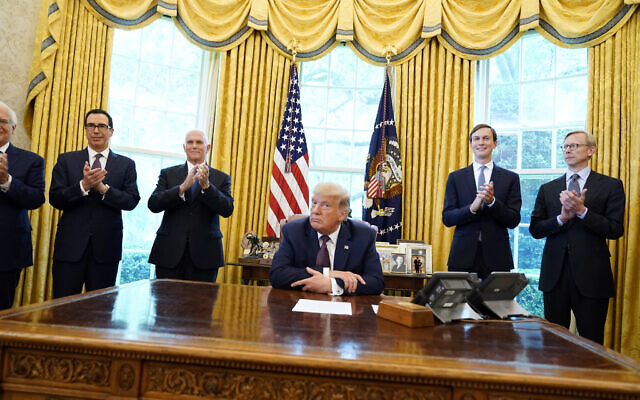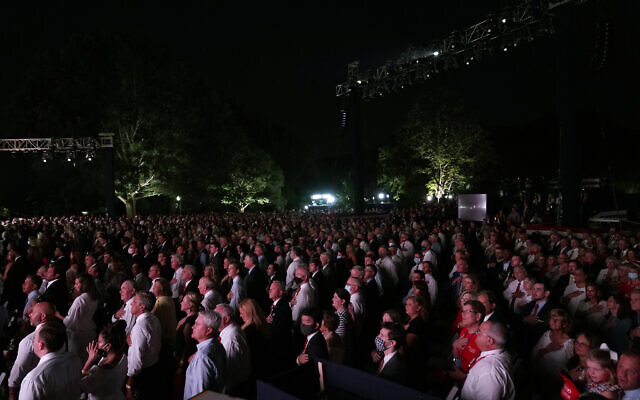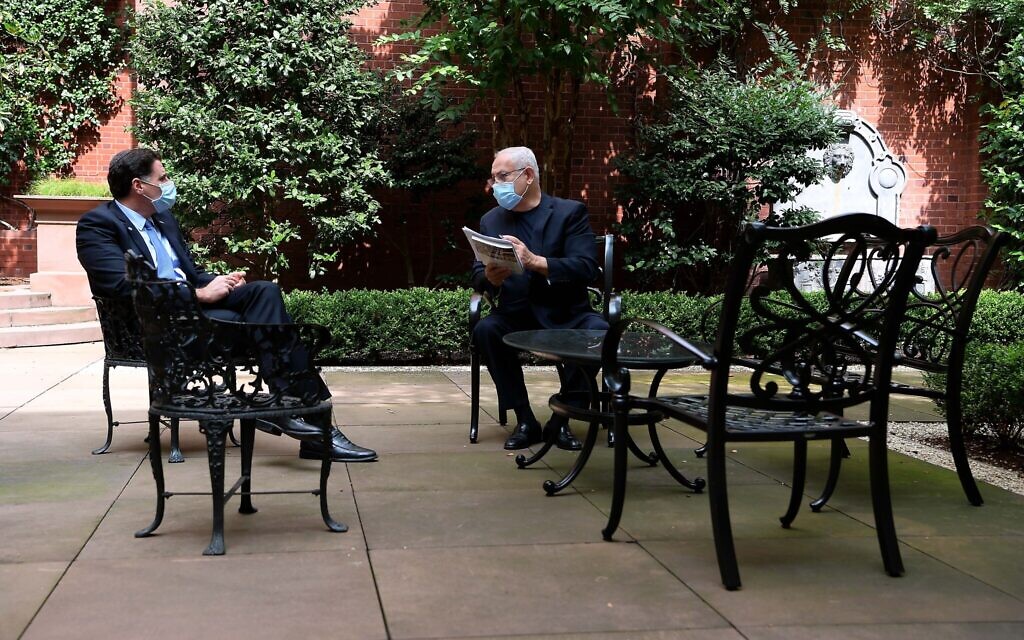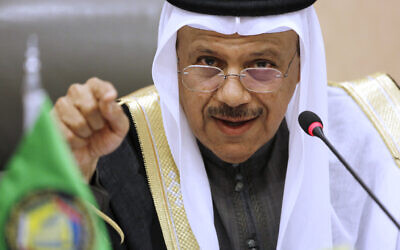Senior US official says documents to be signed at ceremony won’t mention Temple Mount access for Muslims, assures F-35s won’t be sold to UAE unless Israeli military edge maintained

WASHINGTON — The hundreds of guests invited to the White House signing ceremony marking Israel’s normalization agreements with the UAE and Bahrain will be encouraged to wear masks and maintain social distance, but face coverings will not be required, a senior Trump administration official said Monday.
The Tuesday ceremony will take place on the White House South Lawn, the official said in a phone briefing with reporters, calling the setting a “vast space.”
“We’re expecting a few hundred people, but it is our intention to keep it as distant as possible,” the official said, noting that “the Israelis, the Emiratis and the Bahrainis are all taking [the matter] seriously.”
The US leads the world in coronavirus infections and fatalities, with nearly 200,000 deaths, while Israel is second only to Bahrain for the world’s highest coronavirus infection rate by population.
Some 700 people are expected to attend the event, according to Channel 12. Washington, DC guidelines for stemming the spread of the virus state that “mass gatherings of more than 50 people are prohibited.”
The number of expected guests at the signing ceremony will still be half the amount that packed the South Lawn last month to watch US President Donald Trump accept his party’s nomination for reelection.

Israel will impose a nationwide lockdown on Friday to curb its spiraling virus outbreak, becoming the first country to take such a measure twice.
Even before a lockdown goes into effect, a large gathering like the signing ceremony would have been banned in Israel, which caps outdoor crowds in communities with low infection rates at 250 people. Exceptions are made for protests.
Prime Minister Benjamin Netanyahu has drawn criticism for flying to the US as Israel braces for the new lockdown that will see schools and many businesses shuttered for three weeks, even though the normalization agreements are popular with the public.
Anti-corruption protesters who have demonstrated against Netanyahu for weeks, including outside his official residence in Jerusalem, took their protest to Ben Gurion Airport Sunday evening, briefly closing the main roads into the facility by stopping their cars on the roads. They carried banners reading, “You’re detached, we’re fed up.”

The senior White House official said in the briefing that the documents to be signed at the White House ceremony are “roughly complete or complete.”
Prior to the signing event, which will start at 12 p.m. (7 p.m. in Israel), Netanyahu and Trump will hold a bilateral meeting at the White House, and a four-way meeting with the Emirati and Bahraini foreign ministers is set to take place shortly afterwards.
At the signing itself, Netanyahu and UAE Foreign Minister Abdullah bin Zayed Al Nahyan will sign what an Israeli official referred to earlier Monday as a “peace treaty,” while Netanyahu and Bahrain Foreign Minister Abdullatif bin Rashid Al Zayani will sign a less formal declaration of peace.

The peace treaty is an agreement with international legal standing, which must be approved by Knesset, while the declaration is merely a joint statement espousing a commitment to peace.
The senior White House official said that the Israel-UAE document will be much longer than the Israel-Bahrain accord, because the agreement with Manama was only announced on Friday, while the deal with Abu Dhabi became public on August 13.
Trump will sign the two bilateral agreements as a “witness,” or observer,” then the three representatives will sign a separate, joint peace statement the US official referred to as the “Abraham Accords” document.
The official divulged few details when pressed for more information about the agreements.
“We do get into some… substantive issues of the bilateral nature, specifically in the UAE document,” he said.
When asked, the official did say that the issue of Muslim tourists’ access to the Temple Mount would not be mentioned in the documents that will be signed on Tuesday.
During a Friday phone briefing with reporters, after it was announced that Bahrain would follow the UAE in signing a deal with Israel, White House senior adviser Jared Kushner highlighted the inclusion of clauses in both agreements, as well as in Trump’s Israel-Palestinian peace plan, that affirm Israel’s commitment to allow all Muslims to visit and pray at Jerusalem’s al-Aqsa Mosque.
“This will reduce tension in the Muslim world and allow people to separate the Palestinian issue from their own national interests and from their own foreign policy, which should be focused on their own domestic priorities,” Kushner said during the briefing.

Asked on Monday whether there had been any development in the side-negotiations the UAE has been carrying out with the White House to purchase F-35 fighter jets from the US, the Trump official reiterated that “it’s something that’s under consideration.”
While not directly part of the normalization agreement, both US and Emirati officials have acknowledged that the UAE’s willingness to formalize relations with Israel did help move along the negotiations for the F-35 purchase.
Opponents of such a sale argue that it could place Israel’s “qualitative military edge” in the Middle East at risk.
The senior White House official dismissed those concerns, saying, “If it were to go forward, it meant that Israel’s security was not put in harm, and therefore it’s fine.”
The official did not say whether other Arab countries would be sending representatives to the ceremony — something that analysts speculate would hint that other countries in the region are interested in following the UAE and Bahrain with normalization deals.
The official said that senior Congressional Democrats were invited and will “hopefully” attend.
The official was also asked to comment on a Times of Israel report, based on sources with direct knowledge of the normalization negotiations, who said that the US gave the UAE a commitment that it will not back an Israeli annexation move until at least 2024.
“I’ve heard a bunch of different [number of years] being thrown out, and I don’t know where it’s coming from,” the official said, while not explicitly denying the report.
As reported by The Times of Israel
